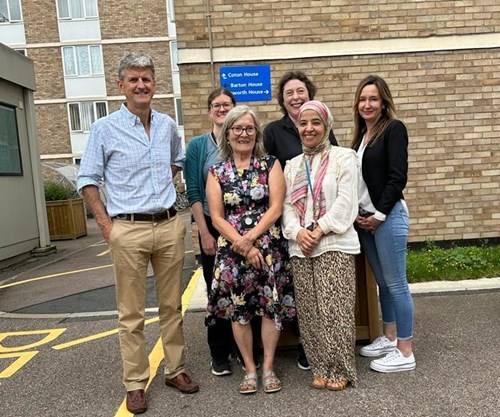A nationwide genetic database to help develop new treatments for Inflammatory Bowel Disease.
The IBD BioResource

The IBD BioResource is a nationwide effort, recruiting people who have Crohn’s Disease or Ulcerative Colitis so that they can help researchers to better understand the causes of IBD and develop better treatments.
The Inflammatory Bowel Disease (IBD) BioResource was launched in 2016 to help improve the lives of people affected by Crohn’s and Colitis. It is a nationwide research platform which aims to drive and facilitate studies in IBD and help develop new treatments for Crohn’s and Colitis.
What is this research looking at?
There have been major advances in understanding the causes of Crohn’s or Colitis, particularly in genetics. Researchers want to use this knowledge to:
- find new treatments for Crohn’s and Colitis
- understand why some people have more severe Crohn’s or Colitis
- understand why some treatments work for some people but not others
- predict disease progression and complications
To do this, they need access to people with Crohn’s and Colitis based on their known genetic makeup and detailed disease characteristics.
This is where the IBD BioResource comes in. This platform is part of the NIHR BioResource, and holds DNA, serum, clinical and genetic data from people with Crohn’s or Colitis recruited from across the UK (https://www.ibdbioresource.nihr.ac.uk/index.php/hospital-sites/open-sites/). All volunteers donate a blood sample and complete a questionnaire. They also consent to be contacted to take part in future medical research, based on analysis of their samples and information they have supplied. The DNA samples are used to help identify genetic risk factors for Crohn’s and Colitis, as well as understanding how genetic make-up affects progression of the disease and treatment response. The goal is to find better treatments, and ultimately a cure for Crohn’s and Colitis.
The IBD BioResource is accessible to researchers in the UK. Researchers can study groups of people with Crohn’s and Colitis selected for having similar patterns disease and similar genetic make-up. This helps researchers draw conclusions more easily from their data.
Once researchers understand the responses in different groups of people with Crohn’s and Colitis, they can create more specific treatments aiming to benefit certain groups of patients.
IBD BioResource Progress
The IBD BioResource greatly exceeded their original target of 25,000 and has recruited ~ 42,000 people with Crohn’s and Colitis to date. This is the largest group of people with Crohn’s and Colitis involved in research in the UK. This project is still thriving with a new recruitment target set at 50,000 people. The larger the IBD BioResource becomes the greater the likelihood of advancing understanding of Crohn’s and Colitis.
Researchers in the UK can request access to the samples and data held in the IBD Bioresource. Studies may involve:
- access to data only (e.g., genetic information)
- access to data and samples (e.g., medication history and stored DNA)
- recall studies (e.g., request of new samples, completing questionnaires or taking part in clinical trials)
Researchers can study groups of people with Crohn’s and Colitis selected for having similar patterns of disease and similar genetic make-up. This helps researchers draw conclusions more easily from their data. Once researchers understand the responses in different groups of people with Crohn’s and Colitis, they can create more specific treatments aiming to benefit certain groups of patients.
The IBD BioResource is achieving its goal to accelerate Crohn’s and Colitis research in the UK. To date, it has received over 85 research applications (39 were data access applications only) from researchers looking to use the data and samples in their own research studies. The IBD BioResource is currently supporting 27 studies (active or recently approved) and has recently completed its contribution to a further 31.
Find out more about the types of studies that the IBD BioResource has facilitated.
What do the researchers think this could mean for people with Crohn's and Colitis?
This large research platform comprising people with Crohn’s and Colitis and their genetic make-up is allowing UK researchers to carry out detailed research into the genes and environmental factors that cause Crohn’s and Colitis and understand why people respond differently to treatments. Long-term, this should lead to the development of better, more targeted treatments. It will also improve our ability to predict disease progression and our understanding on whether Crohn’s and Colitis and other diseases can be prevented.

The IBD BioResource team (from left to right), front row: Miles Parkes, Cathy Thorbinson and Rasha Shawky, back row: Hazel Davies, Rachel Simpkins and Laetitia Pele.
Who is leading the research: Professor Miles Parkes, consultant gastroenterologist at Cambridge University Hospital
Our funding: £120,000 (raised by the Prior Family), combined with more than £1 million from the MRC and the Wellcome Trust
Duration: Long-term
Helpline Service
We know it can be difficult to live with, or support someone living with these conditions. But you’re not alone. We provide up-to-date, evidence-based information and can support you to live well with Crohn’s or Colitis.
Our helpline team can help by:
-
Providing information about Crohn’s and Colitis.
-
Listening and talking through your situation.
-
Helping you to find support from others in the Crohn’s and Colitis community.
-
Providing details of other specialist organisations.
Please be aware we’re not medically or legally trained. We cannot provide detailed financial or benefits advice or specialist emotional support.
Please contact us via telephone, email or LiveChat - 9am to 5pm, Monday to Friday (except English bank holidays).
If you need specific medical advice about your condition, your GP or IBD team will be best placed to help.

 Get involved in research
Get involved in research